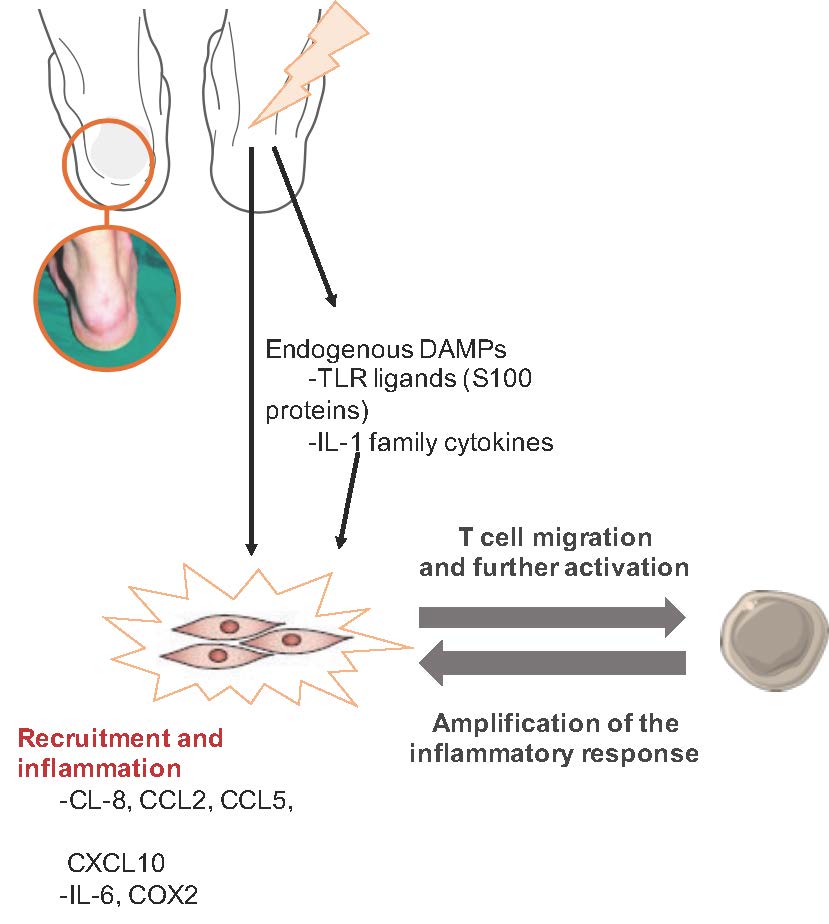Session Information
Date: Monday, November 11, 2019
Title: Spondyloarthritis Including Psoriatic Arthritis – Basic Science Poster
Session Type: Poster Session (Monday)
Session Time: 9:00AM-11:00AM
Background/Purpose: Emerging evidence supports the concept that stromal cell functions extend beyond maintenance of tissue architecture, exerting a key role in choreographing immune responses and thereby defining disease persistence. Accordingly, as enthesitis is a hallmark of spondyloarthropaties (SpA), we propose an interplay between tendon stromal cells (tenocytes) and the adaptive immune system (T cells) in the development of a chronic inflammatory response in SpA.
We aimed to assess the effect of tendon stromal cells (tenocytes) on T cell migration and activation and the impact of these activated T cells on the stroma.
Methods: Tenocytes were explanted from tissue obtained from anterior cruciate ligament (ACL) reconstructions. The effect of damage on tenocytes after stimulation with conditioned media from tendon explants or IL-1ß was evaluated by qPCR. A transwell membrane system was used to test the impact of conditioned media from tenocytes on T cell migration. T cells and tenocytes were co-cultured with or without the presence of a transwell membrane to quantify T cell activation (CD69 by FACS and IFN-γ by ELISA). Changes in gene expression on tenocytes after co-culture with activated T cells were analysed by qPCR.
Results: In the presence of damage, tenocytes upregulated inflammatory mediators (IL-6, COX2), chemokines (CCL2, CCL5, CXCL10, CXCL12) and adhesion molecules (ICAM-1). Conditioned media, particularly after stimulation with IL-1ß, from tenocytes induced T cell migration. Co-cultures of tenocytes and T cells resulted in activation of T cells that was contact dependant. In turn, these activated T cells upregulated the production of inflammatory mediators in tenocytes and increased the COL3/COL1 ratio.
Conclusion: Our results support a role of the tendon stromal compartment in the development and maintenance of an inflammatory response in SpA. Following damage, tendon stromal cells are able to induce the recruitment of T cells, that once enter the tissue interact with the stroma and get further activated. These activated T cells promote an upregulation of inflammatory cytokines and chemokines from the stromal compartment, creating a positive feedback loop that amplifies and maintains this inflammatory response.
To cite this abstract in AMA style:
Garcia-Melchor E, Cafaro G, Johnsson H, Crowe L, McLean M, Reilly J, McInnes I, Akbar M, Millar N. Tendon T-cell Interactions as Drivers of Chronicity in Spondyloarthritis [abstract]. Arthritis Rheumatol. 2019; 71 (suppl 10). https://acrabstracts.org/abstract/tendon-t-cell-interactions-as-drivers-of-chronicity-in-spondyloarthritis/. Accessed .« Back to 2019 ACR/ARP Annual Meeting
ACR Meeting Abstracts - https://acrabstracts.org/abstract/tendon-t-cell-interactions-as-drivers-of-chronicity-in-spondyloarthritis/

